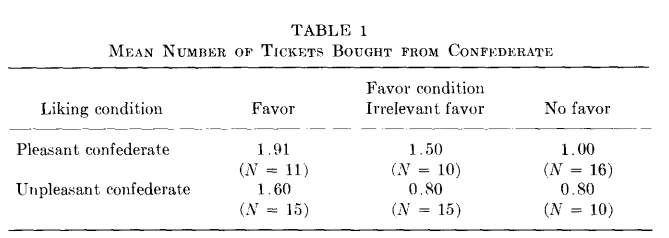As psychology
students, one of the biggest headaches is to recruit participants for our projects.
Every year during the data collection period, we always persuade other psychology
students ‘I will do yours’. This applies the persuasive tactic of ‘reciprocity’
which means we tend to feel obligated to return favours after people do favours
for us.
Regan (1971)
conducted an experiment to examine this reciprocity principle by measuring to
which extent participants would comply with a request from a favour-doer. Two
IVs (liking for the confederate, favour) were manipulated. In the pleasant
condition, the confederate performed in a normal, polite way; in the unpleasant
condition, the confederate attempted to behave in a rude and unpleasant way. In
the favour condition, the confederate gave a Coke to the subject; in the no
favour condition, the confederate simply returned to the experimental room
without offering a soft drink; in the irrelevant favour condition, subjects
received a favour but not from the person who would later ask them to comply
with a request. Compliance was measured the number of raffle tickets subjects
would purchase for the confederate.
In my scenario,
when others asked me to do their experiments, even though they had not
explicitly said they would do mine afterwards, I would be willing to do them
this favour, partially because I knew they were more likely to do mine later.
Reference:
Regan, D. T. (1971). Effects of a favor and liking on
compliance. Journal of
Experimental Social Psychology, 7(6),
627-639.


No comments:
Post a Comment
Note: Only a member of this blog may post a comment.